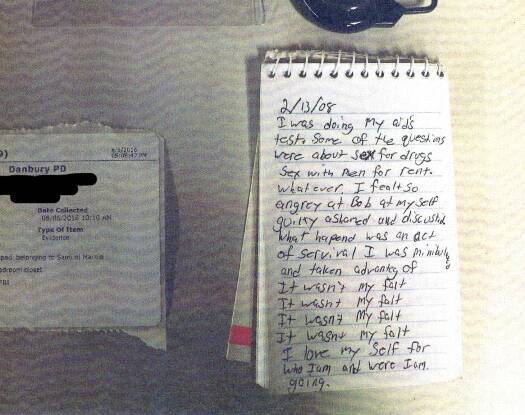‘An easy target’: Sex traffickers prey on drug-addicted young men

Among the items found in Robert King’s trailer was a note written years earlier by Samuel Marino. The misspellings in the note signaled to his mother that he was among the young men trafficked by King and co-conspirators. (Danbury, CT Police)
Bruce Bemer made no secret of what his money could buy. The wealthy Connecticut businessman admitted to police and the FBI that he purchased sex from drug-addicted young men. But Bemer strenuously denied a far more serious charge: knowingly participating in a human trafficking operation.
Three months ago, the Connecticut Supreme Court agreed with the 68-year-old defendant — ruling unanimously that a lower court failed to prove he was aware of the trafficking operation that provided the young men he paid to perform sex acts.
Far more boys and young men are victims of commercial sexual exploitation than previously understood, a GBH News investigation has revealed, and the Connecticut case shows how difficult it is for prosecutors to hold alleged abusers accountable. It also points to how drug addiction and treatment facilities present key recruitment opportunities for predators, anti-trafficking advocates say.
It is believed that the traffickers who provided Bemer with young men operated for almost 30 years, according to a Danbury detective who was involved in the case. Robert King and William Trefzger preyed on emotionally damaged and troubled youth, often using their drug addictions to gain trust before turning them into sex workers.
The Connecticut high court’s decision shocked many in the state who have followed the case, but perhaps no one more than Lin Marino, whose son, Samuel, was one of the trafficking victims from whom Bemer purchased sexual acts.
“It removes any justice that we may have received for our son,’’ Marino told GBH News. “It was devastating news.”
Samuel died in a car crash in 2009 while being pursued by police after a carjacking, according to a police report. But his mother and others are convinced he took his own life by purposely crashing the car he was driving.
‘He was ashamed of being trafficked’
Samuel Marino took chances. He excelled in snowboarding and loved nothing more than BMX biking. He broke a lot of bones doing what he loved. And after graduating Tolland High School in 2001, Samuel, who had a learning disability, built barns for a living, putting further strain on his body.
Lin Marino said he was often in pain. That led him to OxyContin, then heroin. Through tears, his mother recalled asking Samuel to leave the house.
He went to several rehabilitation centers, she said.
“Little did we know that every time he would come out of a rehab facility, they were waiting for him to readdict him so they could traffic him,” she said.
Samuel stayed at a Liberation House facility in Stamford for nearly six months, court records show. Nobody at the organization’s corporate headquarters could be reached for comment.
It was outside the rehab center in Stamford that Samuel met with Robert King and William Trefzger.
For the rest of the story, including the audio version, please visit WGBH.org. This story is part 5 of “Unseen,” a GBH News investigative series uncovering the growing evidence that there are thousands of boys and young men who are victims of commercial sexual exploitation — far more than previously understood.
